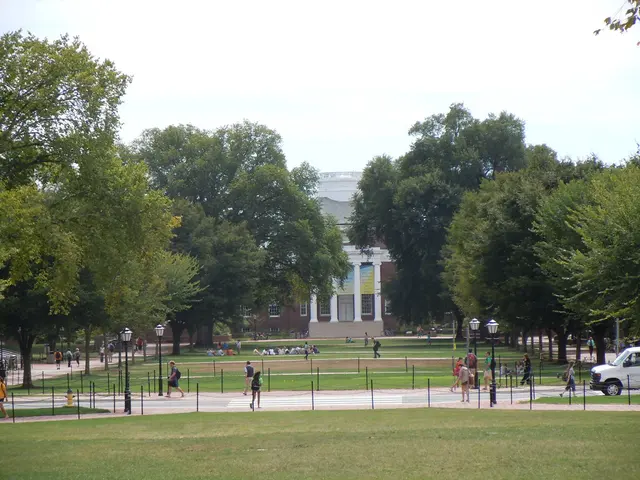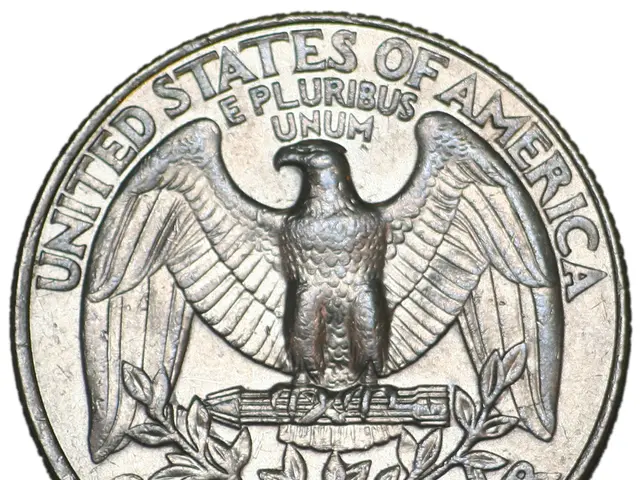U.S. Energy Supply Could Potentially be Sustained by Bitcoin Mining, Pending Regulatory Prioritization
Let's Talk Crypto in the USA:
The crypto world in the States is getting a makeover as policymakers at the federal and state levels discuss the idea of strategic Bitcoin reserves and a legislative framework for clarity within the industry.
Bitcoin: The Cornerstone of US Crypto Tech's FutureIn just recent weeks, President Trump has declared the formation of a national Bitcoin reserve under executive order, while US Senator Cynthia Lummis has introduced legislation for the creation of a US strategic Bitcoin reserve. If passed, these proposals would emphasize the significance of Bitcoin in financial markets and provide stakeholders, such as miners and investors, with long-term confidence.
Mining MattersFor Bitcoin miners, this turn of events represents a significant opportunity. Clear regulations can promote innovation, attract investment, and encourage sustainable growth in the sector. A balanced approach that merges accountability and opportunities will strengthen the US's global leadership position, paving the way for both the Bitcoin mining and energy sectors to thrive.
Regulatory RenaissanceHistorically, miners have been subject to a mix of state and federal regulations. However, Washington is switching gears, moving towards more structured oversight, and collaborative measures. A bill mirroring the Financial Innovation and Technology for the 21st Century Act (FIT21) is already in development with the intention of eliminating uncertainty and outlining the roles of the SEC and CFTC. By replacing reactive regulation with a more robust framework, FIT21 (or a future, updated iteration) may provide the industry with much-needed stability, aiding its growth.
Integrating StablecoinsBills like the Lummis-Gillibrand Payment Stablecoin Act and Senator Hagerty's GENIUS Act represent crucial steps forward in integrating stablecoins into the financial system. Passage of the GENIUS Act could lead to increased liquidity in crypto markets, attract institutional investment, and bolster Bitcoin's position as the reserve asset in the digital economy.
Navigating the New LandscapeOne crucial aspect to remember is that the GENIUS Act primarily targets stablecoins, with minimal effect on Bitcoin mining regulations initially. However, broader crypto regulations continue to evolve, opening the door for possible benefits for mining, such as increased institutional demand and long-term regulatory clarity.
Local ProgressAt the state level, many states have already embraced Bitcoin mining as a catalyst for energy innovation and economic growth. Several US states including Texas, Alabama, Arizona, and Florida, have introduced legislative proposals to create Bitcoin strategic reserves. While not every proposal will pass, the wave of activity suggests growing recognition of Bitcoin’s potential as a financial asset.
Partnerships and ProgressPublic-private collaborations are key at the state level. In Texas, miners are collaborating with the Electric Reliability Council of Texas (ERCOT) to stabilize the power grid, contributing to energy resilience across the nation. In Arkansas, local governments are prohibiting discrimination against Bitcoin miners, and Montana has passed bills to protect the industry from government interference, recognizing its positive economic impact on local communities.
Revitalizing EconomiesMining operations have driven tangible economic benefits to communities across the nation. With the right regulatory approach, these economic revival efforts can continue, striking a balance between mining's economic benefits and responsible energy use.
Looking ForwardCrypto's future in the US is taking shape. With an expansive energy infrastructure, increasing regulatory clarity, and a commitment to sustainable growth, America is poised to lead the crypto economy. Lawmakers now have the opportunity to put pen to paper and shape regulations that foster innovation, rather than stifle it. By prioritizing Bitcoin's foundational role, ensuring mining flourishes, and crafting incentives tailored to the industry, the US will secure its place at the forefront of the global crypto landscape.
Shaping Energy Storage with Bitcoin MiningAbdumalik Mirakhmedov is the co-founder and president of GDA and a tech investor and experienced manager with a focus on digital assets and tech industries. He combines his expertise and confidence in Bitcoin to build the most successful global Bitcoin mining company.
Sources:[1] Cointelegraph (2021). "What the Senate farm bill means for the crypto industry." https://cointelegraph.com/news/what-the-senate-farm-bill-means-for-the-crypto-industry[2] Coindesk (2021). "Lummis aims to boost US crypto's competitiveness with federal reserve-backed digital dollar." https://www.coindesk.com/policy/2021/07/14/lummis-aims-to-boost-us-cryptos-competitiveness-with-federal-reserve-backed-digital-dollar/[3] Cointelegraph (2021). "What to expect from U.S. President Joe Biden's crypto executive order." https://cointelegraph.com/news/what-to-expect-from-u-s-president-joe-biden-s-crypto-executive-order[4] Coindesk (2021). "Lummis draft bill could define digital assets as securities, impose stablecoin reserve requirements." https://www.coindesk.com/business/2021/03/18/lummis-draft-bill-could-define-digital-assets-as-securities-impose-stablecoin-reserve-requirements/[5] Cointelegraph (2021). "Bitcoin demand from institutional investors could explode in Q2 – report." https://cointelegraph.com/news/bitcoin-demand-from-institutional-investors-could-explode-in-q2-report
- As policymakers consider strategic Bitcoin reserves and a legislative framework in the USA, the significance of Bitcoin in financial markets is being emphasized by presidential declarations and proposed legislation.
- A more structured approach to oversight and collaborative measures proposed in the Financial Innovation and Technology for the 21st Century Act (FIT21) aim to eliminate uncertainty and clarify roles for Securities and Exchange Commission (SEC) and Commodity Futures Trading Commission (CFTC).
- With the passage of the GENIUS Act, the integration of stablecoins into the financial system could lead to increased liquidity in crypto markets and bolster Bitcoin's position as the reserve asset in the digital economy.
- While the GENIUS Act may primarily target stablecoins, the ongoing evolution of crypto regulations could potentially benefit Bitcoin mining with increased institutional demand and long-term regulatory clarity.
- Several US states have already recognized Bitcoin's potential as a financial asset and are introducing legislative proposals to create Bitcoin strategic reserves, such as Texas, Alabama, Arizona, and Florida.
- In public-private collaborations, Bitcoin mining is being used to stabilize power grids in Texas and build energy resilience across the nation.
- Local governments in states like Arkansas and Montana are supporting the Bitcoin mining industry by prohibiting discrimination against miners and protecting the industry from government interference.
- GDA, a global Bitcoin mining company led by tech investor and experienced manager Abdumalik Mirakhmedov, aims to capitalize on the growing regulatory clarity and economic potential of Bitcoin mining.




